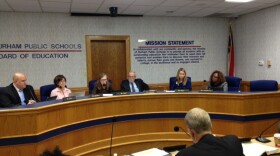Lawmakers in a House committee on education spending released their budget proposal Thursday, and it includes several policy changes. One of those is an adjustment to the A-F school grading system.
Critics have argued the school grading system relies too heavily on student achievement on state tests and not enough on year-to-year growth in those test scores. The committee's proposal seeks to address that concern by increasing the weight given to growth from 20 percent to 50 percent. It also makes permanent the 15-point grading scale. Schools were supposed to move to a stricter 10-point grading scale next school year.
On the financial side, the committee wants to fund literacy coaches in elementary schools where student performance is in the bottom 20 percent. Literacy coaches, according to the proposal, are teachers with extra training in teaching literacy. They would support teachers and work one-on-one with struggling readers.
To find the $25 million needed for reading coaches, the proposal cuts in half the $20 million set aside for first and second grade summer reading camps and abandons a $26 million plan to reduce first grade class sizes.
Overall, the proposed budget would add about an extra $13 million in K-12 spending. That includes an extra $17 million for textbooks and classroom resources, as well as funding to pay teachers $50 bonuses for each student who passes their Advanced Placement or International Baccalaureate exam, or who gets an industry certification.
The adjustment to the controversial A-F school grading system wasn't the only policy change that made its way into the proposal. The proposal also:
- Creates a pilot program for a new teacher compensation model in up to 10 school districts. Those districts would find ways to pay teachers based on effectiveness and leadership roles.
- Relaxes withdrawal rate requirements for the state's virtual charter schools. It allows them to have withdrawal rates up to 35 percent, rather than 25 percent.
- Creates a scholarship program for teachers who agree to work in hard-to-staff schools.
- Delays the implementation of the North Carolina Guaranteed Admissions Program (NCGAP) for one year.
- Shifts funding so that all teacher assistants are paid for with lottery revenues.
- Funds three new principal preparation programs.
The committee's proposal will be considered in House appropriations meetings next week. The House appropriations committee plans to discuss teacher and principal compensation next Tuesday. House members say they want to vote on their full budget next Friday.










